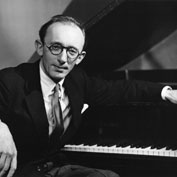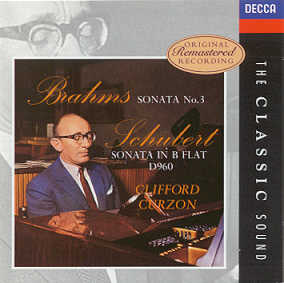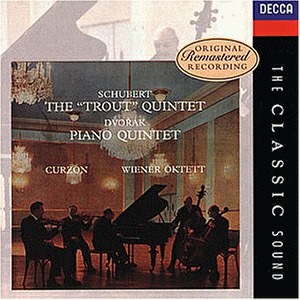| Music Home | Photo Gallery | Discography | Jacket Images | Korean |
Clifford Curzon(18th May 1907 ~ 1st Sep. 1982)
[ Stained-Glass of a tone ]
 [ left photo
] Curzon at his young age ( from Philips Classics ; The 20th century pianists )
[ left photo
] Curzon at his young age ( from Philips Classics ; The 20th century pianists )
I cannot have confidence with how well the art of piano playing is succeeded nowadays. I think its tradition is found more easily in the late pianists' records than the live concerts - surely Clifford Curzon is one of them, who is not as popular as Horowitz, Sviatoslav Richter, or Backhaus. Nowadays, what pianist can be endured by the contract company in case he does not approve to release his recording after all the session is finished so often except for him?
Clifford Michael Curzon was born in London. He is a nephew of the composer Albert W. Ketelbey, who was famous by 'In a persian market'. He entered London Royal Academy at thirteen, learning Charles Reddie and Catherine Goodson. In 1923, Henry Wood(See footnote) regarded and selected him as a solist of Bach's concerto for 3 cembalo in Promenade Concert(his official début). He already got a position of the Royal Conservatory in 1926, but was very much impressed by Artur Schnabel, and learned piano at his classes in Berlin Conservatory from 1928 to 1930. Later he went to Paris, Wanda Landowska and Nadia Boulanger taught him. He returrned to England in 1932 as a full-time concert pianist, and his American début was 1939. When young there were 20th-century musics in his repertoire, but later he concentrated on German classical/romantic period, from Mozart to Brahms. Other romantic composers such as Tchaikovsky, Grieg, and Rachmaninov were not major concern. He began recording in 1941 by Decca, and remained exclusive artist of Decca to the early 1970s except some recordings by American Columbia(present Sony Classical) and EMI. In this period, he was undoubtedly one of the representative pianist of Decca along with Backhaus, Ashkenazy, Gulda, and Julius Katchen. His main stage was Europe, and recordings are mostly with European orchestras and ensembles, too. His studio recording activity was ended about 1972, after which he only remained the broadcast tapes(some by BBC records). He was honored by 'Sir', and died on 1st September 1982 in London.
 Curzon was far from the image of the
brilliant virtuoso like Horowitz, but very highly
acclaimed in the critics and represents at the top of
Decca. Many
fans recommend his Schubert sonata No.21 to know his
music, in which his tone color is amazing. It provokes me
that the stained glass of a church lighted by the sun. Unfortunately, he was as serious in
recording as Rudolf Serkin, and perhaps the most serious at the point
of release in the artists I have ever known. Ray
Minshull, who was the chief of the classical music part
of Decca from 1967 to 1994 after John Culshaw moved to
BBC, wrote some behind stories with this artist,
difficult to satisfy. Minshull was very much satisfied
with the results of 1967 Mozart Concertos session with
Kertész(Nos. 23,24,26 and 27), asking Curzon to finish
the complete recording of the concertos. He was eager to
do them because Curzon was for him also. But Curzon's
nature hindered it, only Nos. 23/24 with Kertész and
Nos. 20/27 with Britten were released. Curzon did never
accept his concentration on work and the delicate frame,
so did not like the recording team unfamiliar to him; his
late Decca recordings are done with his favorable team -
Minshull and the engineer Kenneth Wilkinson. Kirsten
Flagstad admired the artist Curzon, and once visited him
in studio. But she could not meet him. And - when Curzon
was angry with hindrance of work, none was able to stop
him.
Curzon was far from the image of the
brilliant virtuoso like Horowitz, but very highly
acclaimed in the critics and represents at the top of
Decca. Many
fans recommend his Schubert sonata No.21 to know his
music, in which his tone color is amazing. It provokes me
that the stained glass of a church lighted by the sun. Unfortunately, he was as serious in
recording as Rudolf Serkin, and perhaps the most serious at the point
of release in the artists I have ever known. Ray
Minshull, who was the chief of the classical music part
of Decca from 1967 to 1994 after John Culshaw moved to
BBC, wrote some behind stories with this artist,
difficult to satisfy. Minshull was very much satisfied
with the results of 1967 Mozart Concertos session with
Kertész(Nos. 23,24,26 and 27), asking Curzon to finish
the complete recording of the concertos. He was eager to
do them because Curzon was for him also. But Curzon's
nature hindered it, only Nos. 23/24 with Kertész and
Nos. 20/27 with Britten were released. Curzon did never
accept his concentration on work and the delicate frame,
so did not like the recording team unfamiliar to him; his
late Decca recordings are done with his favorable team -
Minshull and the engineer Kenneth Wilkinson. Kirsten
Flagstad admired the artist Curzon, and once visited him
in studio. But she could not meet him. And - when Curzon
was angry with hindrance of work, none was able to stop
him.
He never let his recordings open unless he
thought it perfect. The Mozart's concerto recordings are the
case of it. Nos. 23/27 with Szell/VPO is not released before the Original
Masters Vol.I box as he thought it could not be released.
Nos. 26/27 with Kertész/LSO was convicted to the same
fate, so can come to light by only Philips pianist series
plan(but can Decca open the recording banned by the
player?) The famous record, Nos. 20/27 with Britten/ECO
could not be released before 8 years have passed. The
reason was that he did not signed OK because he realised
he could gave other nuances in playing No.27. It took 8
years for him to change his minds to let it released
under the condition that it had to be deleted from
catalog when another recording was done. The live
recording planned with Haitink/Royal Concertgebouw on
1984 was not realised due to his death.
 His Decca
recordings are very precious to his fans and the first
recommendations because he approved the release only if
he was satisfied with the recorded performance.
Therefore, I guess he should not like the recent
broadcast issues. In other words, we had better choose
Curzon's real interpretations in
the Decca studio works. For recent several years, Decca
alloted many of Classic Sound, Legend, Original Masters
series to him, which has me happy as his recordings were
not frequent in the record shops before these releases. [
Frankly speaking, I did not have many of his recordings
before the issues because Korean LP release is not
extensive for him ]
His Decca
recordings are very precious to his fans and the first
recommendations because he approved the release only if
he was satisfied with the recorded performance.
Therefore, I guess he should not like the recent
broadcast issues. In other words, we had better choose
Curzon's real interpretations in
the Decca studio works. For recent several years, Decca
alloted many of Classic Sound, Legend, Original Masters
series to him, which has me happy as his recordings were
not frequent in the record shops before these releases. [
Frankly speaking, I did not have many of his recordings
before the issues because Korean LP release is not
extensive for him ]
By my discography(data
from internet and my disques), he recorded about 40 works
by 15 composers. In personal, I think his best recording is
Schubert's sonata No.21(D.960).
His tempo is somewhat fast, viewpoints are very
consistent and persuasive, and tone color very
transparent and beautiful. The next recommendation are
ones with the members of Vienna Philharmonic(Vienna Octet
and Vienna Philharmonic Quartet); Quintet by Dvorak, Schubert,
and Franck. The strings' sound
are soft and warm, harmonized to piano's beautiful and
classical tendency. There is other recordings with
Budapest SQ(American Columbia), and available now by
Naxos historical outside USA. However, I prefer later
Decca recordings. Dvorak/Schubert is issued by Classic
Sound series(now in Original Masters box), which is too
good record to miss as a chamber music fan. Brahms' concerto No.1 with
Szell/London Symphony has to be recommended as the
standard with those of Backhaus, Gilels, and Serkin.
I prefer his romantic composers'
recordings(Schubert, Schumann, and Liszt..) to Mozart's.
The recent Legend release is very good - Schumann's
Fantasy, Kinderszenen, Schubert 'Wanderer-Fantasie'.
Schubert's sonata No.17(D.850) seems to have a problem of
the condition of master tape, and 'Moment musicaux is too
hard for my comfortable listening. Double Decca issue
includes his concertos - Tchaikovsky No.1, Grieg,
Rachmaninov No.2, and Brahms No.2(the later two are
monaural) are high level and cheap, which shows his
virtuosity in the romantic concertos(now released again
by Original Masters box). It's very unhappy that
Beethoven recordings are not frequent, moreover the
stereo recordings are only Emperor with Knappertsbusch
and Eroica variations. I think the latter is the better.
Concerto No.4 with Knappertsbusch is released in Legend
series(with Emperor, monaural), but not so impressive as
the formers.
Curzon resembles Edwin Fischer in some respects. Both of them were taught by more or less romantic teacher, but their pianism are near that of 20th century. [Interestingly, Curzon heard Furtwängler's concerts in Berlin and very much impressed with the overwhelming music. He remembered it vividly to much later. It's very interesting for me to consider his classical and more or less controlled music-making. ] The older, the more they were prone to the classical repertoire, very highly praised at concert though tortured by the stage fear, and (the most important one) they both remained records with the individual interpretations and tone color.
- Reminiscence by Ray Minshull ; from the CD liner notes of Decca 417 288-2 and 452 888-2
- CBC Radio
- Joe Lam's Music Page
- Philips Classics ; The 20th century pianists
- Curzon's reminiscence about Furtwängler ; Tribute to Wilhelm Furtwängler
- XReferences ; Who's Who in the Twentieth Century - Oxford University Press, © Market House Books Ltd 1999
Footnote ; Sir Henry Wood ]
famous conductor, remained many transcriptions for orchestra including 'Pictures at an exhibition'. He is the midwife of London Symphony Orchestra in spite of himself - He was very upset by the habitual deputy playing of English orchestras, therefore suggested the prohibition of it when he was in charge of the Queens Hall Orchestra. The reason was that the ensemble which the conductors had steadily constructed by many rehearsals was frequently collapsed at the stage performance by the deputy players not accustomed to the conductors. However, the members of the orchestra would not accept the suggestion and about a half of them left. They founded a new orchestra, which was named LSO. LSO's tradition is not to accept a long ruling under a conductor, which may stem from such a beginning, I guess.
(c) 2000~ , Youngrok LEE ; Link free, but please get my approval before you reuse, copy, or quote this materials.
| Music Home | Photo Gallery | Discography | Jacket Images | Korean |
Created ; 15th Aug. 2001
(original
Korean text created on 25th Oct. 2000)
Last update ;
29th Apr. 2006